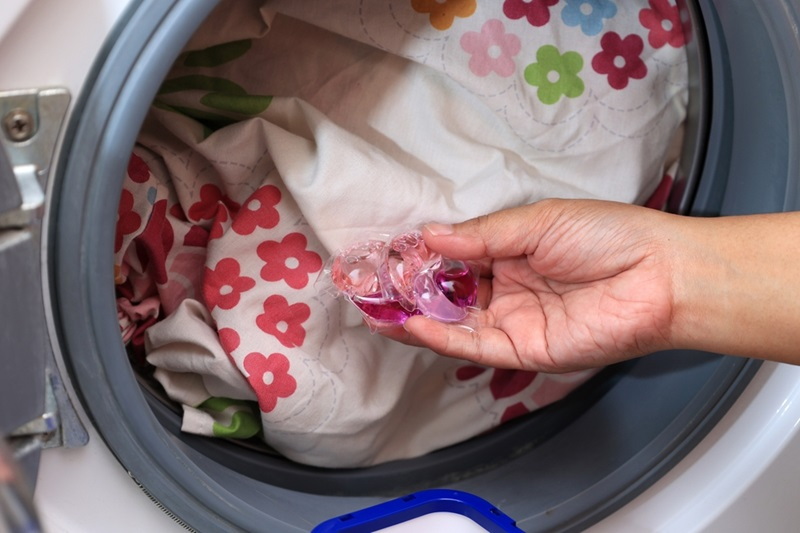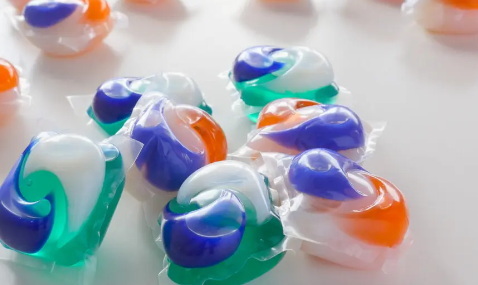Dongguan UFine Daily Chemical Co.,Ltd.
- All
- Product Name
- Product Keyword
- Product Model
- Product Summary
- Product Description
- Multi Field Search
Views: 222 Author: Tomorrow Publish Time: 10-14-2025 Origin: Site











Content Menu
● Understanding Fleas and Their Life Cycle
● Do Laundry Soap Pods Kill Fleas?
>> Key Point: Pods as Part of Laundry Treatment
● Limitations of Laundry Soap Pods for Flea Control
● The Science Behind Soap's Effect on Fleas
● Role of Washing Machine and Dryer in Flea Control
● Tips for Using Laundry Pods to Kill Fleas
● Alternative or Complementary Flea Control Methods
● Environmental and Preventive Measures for Flea Control
● Frequently Asked Questions (FAQ)
>> 1. Can laundry soap pods kill fleas on pets directly?
>> 2. Do laundry pods kill flea eggs and larvae or just adult fleas?
>> 3. Is hot water necessary when washing clothes to kill fleas?
>> 4. Can laundry soap pods prevent re-infestation of fleas?
>> 5. What other methods should be used with laundry pods for flea control?
Fleas are a common pest problem for pet owners and households alike, and finding effective ways to kill and control fleas is a priority. One popular question is whether laundry soap pods can kill fleas. While laundry soap pods have powerful detergents meant for cleaning clothes, their effectiveness against fleas is not straightforward. This article explores how laundry soap pods interact with fleas, their ability to kill or repel fleas, and alternative approaches for flea control.

Fleas are small, wingless insects that feed on the blood of mammals and birds. Their life cycle includes eggs, larvae, pupae, and adults. Most fleas in an infestation are not on pets but hidden in the environment, such as in carpets, bedding, and furniture. This complexity makes flea control challenging because targeting only adult fleas on pets ignores the eggs and larvae nearby.
Adult fleas live on animals and can jump on and off hosts, while eggs and larvae develop in the surrounding environment. Effective flea control requires eliminating all life stages, not just adult fleas.
Laundry soap pods are pre-measured packets of concentrated detergent designed to dissolve in water during laundry cycles. Detergents in pods contain surfactants, enzymes, and other agents that break down grease and dirt from fabrics.
Surfactants reduce water surface tension, allowing water to penetrate and clean more effectively. This property is also crucial in how soaps and detergents can affect insects like fleas by disrupting their protective waxy exoskeleton, causing them to drown in water.
Laundry soap pods themselves are formulated for fabric cleaning and not specifically for treating fleas. However, the detergents and surfactants in the pods can kill fleas under certain conditions:
- When fleas come in direct contact with soapy water, the surfactants break down the fleas' protective outer layer.
- This damage allows water to enter the flea's body, causing them to drown.
- The soap's ability to lower water surface tension contributes to this drowning effect.
However, laundry soap pods are usually used in washing machines where the fleas might be on fabric, not directly exposed or soaked in soap. The washing process with soap, water, mechanical agitation, and hot temperature collectively contribute to killing fleas on clothes and pet bedding.
Laundry soap pods can help kill fleas present on clothes and bedding when used in a washing machine with a hot water cycle because:
- The combination of soap, water, heat, and agitation kills adult fleas, larvae, and eggs.
- Hot water temperatures (above 95°F) are critical to kill all flea stages.
- The washing machine cycle physically removes fleas and eggs.
In summary, laundry soap pods contribute to killing fleas on washable fabrics, but the soap alone outside a washing context is not enough to control or eliminate a flea infestation.
Although laundry pods help to kill fleas on fabrics, relying solely on pods or laundry detergent for flea treatment has limitations:
- Pods cannot kill fleas on pets directly.
- The pods do not kill fleas in other life stages outside the washed fabrics, such as pupae in cocoons.
- Laundry treatment does not prevent re-infestation from fleas in other areas of the environment or on pets.
- Pods cannot substitute comprehensive flea control methods involving treatment of pets and living areas.

The primary way soaps and detergents affect fleas is through the disruption of the fleas' exoskeleton. Fleas have a hard outer protective coating covered by a thin layer of wax, which helps prevent dehydration. The surfactants in soaps dissolve this waxy layer, exposing the flea to water. This causes them to drown or die of dehydration because their exoskeleton no longer protects them.
Laundry pods contain surfactants similar to those in other soaps but are concentrated and designed mainly for fabric cleaning. This concentrated detergent, when diluted properly in a washing cycle, can break down flea exoskeletons effectively, but the environment in the washer and dryer plays a crucial role as well.
The washing machine does more than just apply soap; it combines heat, mechanical agitation, and detergent exposure, all essential for killing fleas:
- Heat: Most fleas and their eggs cannot survive temperatures above 95°F. Washing clothes in hot water kills these pests at various life stages.
- Mechanical Action: Agitation physically dislodges fleas, their eggs, and larvae from fabric fibers.
- Detergent: The soaps and surfactants attack the flea's body and contribute to their death.
- Dryer Heat: The high heat of a dryer cycle further eliminates any remaining fleas and eggs.
Without the combined factors of heat and agitation, soap alone would be less effective. For instance, soaking flea-infested fabrics in cold soapy water might kill some fleas but will not eliminate the problem entirely.
- Use the hottest water setting possible according to fabric care instructions.
- Include the laundry soap pod as directed to ensure the right concentration of detergent.
- After washing, use a high-heat dryer cycle to maximize flea and egg elimination.
- Wash pet bedding, blankets, and clothes frequently during a flea infestation.
- Vacuum floors, carpets, and furniture before washing fabrics to reduce flea populations.
Laundry soap pods contain concentrated chemicals designed for cleaning fabrics and can be toxic if ingested by pets or children. Pets should not be directly exposed to laundry pods or detergent without dilution and caution. Using pet-safe flea treatments supervised by veterinarians is recommended.
Avoid placing laundry pods in locations accessible to pets, as ingestion can lead to poisoning, vomiting, and serious health issues.
Effective flea management requires a multi-step approach, often combining the use of laundry soap pods with these methods:
- Bathing pets with flea shampoos or mild soap (like diluted dish soap) can kill fleas on the animals temporarily but may irritate their skin if used frequently.
- Vacuuming carpets and furniture removes fleas and larvae from living areas.
- Use of Borax or specialized flea powders on carpets can dehydrate and kill flea larvae and adults.
- Use of flea medications and treatments recommended by veterinarians ensures long-term control on pets.
- Laundry washing of pet bedding, clothes, and blankets with hot water and detergent pods to kill fleas and eggs.
- High-heat drying cycle after laundry further ensures fleas are killed by heat.
Together, these measures improve the chances of fully managing and eliminating flea infestations.
- Regularly clean and vacuum floors, carpets, upholstery, and pet resting areas.
- Dispose of vacuum bags or clean vacuum contents immediately to prevent fleas from escaping.
- Treat outdoor areas such as yards if pets spend time outside, using safe insecticides or natural flea repellents.
- Consider preventive flea medications for pets prescribed by a veterinarian to reduce infestations before they grow.
Laundry soap pods can help kill fleas on clothes and pet bedding when used correctly in a washing machine with hot water cycles. The surfactants in the pods damage fleas' protective exoskeleton, leading to their death during washing. However, laundry pods alone cannot eradicate a flea infestation because they do not affect fleas on pets or in other life stages hidden around the home. Comprehensive flea control involves treating pets, cleaning living environments, using veterinarian-recommended medications, and laundering infested fabrics regularly.

No, laundry soap pods are not formulated for direct use on pets and can be harmful. They kill fleas on fabrics when used in washing but should not be used on animals.
Washing clothes and bedding with laundry pods in hot water can kill adult fleas, eggs, and larvae, but pods alone without heat and washing action are not effective against all flea life stages.
Yes, hot water (above 95°F) combined with soap and agitation is critical to kill fleas at all life stages during laundry.
Laundry pods can clean infested fabrics but cannot prevent fleas from returning if pets and home environments are not treated properly.
Pet flea shampoos, medications, vacuuming, Borax treatment on carpets, and regular washing of pet bedding and fabrics are recommended alongside laundry pods.